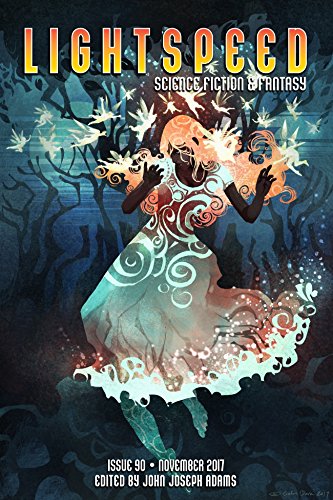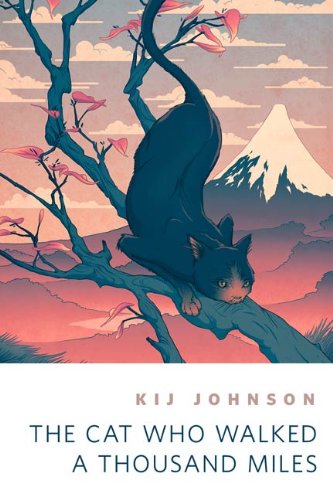Our weekly exploration of free and inexpensive short fiction available on the internet. Here are a few stories we’ve read that we wanted you to know about.

![]() “The Faerie Tree” by Kathleen Kayembe (Nov. 2017, free at Lightspeed, $3.99 Kindle magazine issue)
“The Faerie Tree” by Kathleen Kayembe (Nov. 2017, free at Lightspeed, $3.99 Kindle magazine issue)
Marianne’s family is in turmoil. Her sister, who always had such plans for her life, has come back from boarding school pregnant, moving back home with her husband. The real problem is that Marianne can see there’s something hugely amiss: Sister, who was so lively, now spends most of the time sitting like a china doll, staring at her hands in her lap. Her new husband is a strange-looking beanpole of a man, with eyes that are black buttons, a mouth that looks like a doll’s sewn-on smile, and skin like rough gunnysack. Marianne can see there’s something even more wrong inside of him (“His smile’s like still water, stagnant and sick, a birthing ground for things that’s just born rotten”).
There’s a gnarled tree in the family’s front yard that’s full of faeries. Marianne thinks about asking the fairies for help getting rid of the beanpole man, but she hesitates because, with faeries, there’s inevitably a steep price to be paid for any assistance. Her grandmother Mamaw once called on the fairies to have them help with a family problem long ago, when Marianne was a baby.
I saw ’em once, when Mamaw called ’em out to set me straight. I think about Sister’s man and I’m tempted, fierce as Jesus in the desert, but I don’t. Mamaw told me the price she’d paid for letting ’em loose; said giving up her grand-baby’s the hardest thing she ever done. Sure, she got back her son and he raised up our family with Momma, but sometimes she must’a looked at us and just hated.
Marianne hesitates too long and disaster strikes the family. But she hopes that the faeries can still help set things straight.
The biggest attraction in this story for me is how Kathleen Kayembe, through Marianne’s narration, gradually discloses who Marianne is and what the deal was that her Mamaw made with the fairies years ago. It’s hinted at in the paragraph quoted above, but as Marianne negotiates her price with the faeries, the painful past ― and its relevance to Marianne’s current problem ― becomes clear. Marianne’s folksy voice rings true, and her plight and willingness to sacrifice for her sister’s sake hits home. ~Tadiana Jones
![]() The Cat Who Walked a Thousand Miles by Kij Johnson (2009, free at Tor.com, 99c Kindle version)
The Cat Who Walked a Thousand Miles by Kij Johnson (2009, free at Tor.com, 99c Kindle version)
This cat was the smallest of her litter of four. Her fur had been dark when she was born, but as she grew it changed to black with speckles of gold and cinnamon and ivory, and a little gold-colored chin. Her eyes were gold, like a fox’s.
I fell in love with Small Cat as soon as I read this lovely description. Small Cat lives in historic Japan, sharing a home in the gardens of an abandoned mansion with her many aunts and cousins. Small Cat and her relatives also share their fudoki, their oral traditions and folklore that define who they are as individuals and as a family.
A cat with no fudoki was a cat with no family, no home, and no roots.
When an earthquake and the resulting fire destroy her home and scatter her family, Small Cat sets off on a long journey northwards to find the home of an ancestor, the main character in her favorite fudoki, the Cat From the North.
The Cat Who Walked a Thousand Miles is a charming, rather quiet fable about finding ― or perhaps a better word is creating ― your own story. This novelette is episodic and meanders a little, rather like Small Cat on her journey, but I recommend it for those who like animal fables, especially those starring cats. ~Tadiana Jones
![]() “The Dust Enclosed Here” by Kage Baker (2001, originally published in Asimov’s, free at Infinity Plus, also collected in Black Projects, White Knights: The Company Dossiers)
“The Dust Enclosed Here” by Kage Baker (2001, originally published in Asimov’s, free at Infinity Plus, also collected in Black Projects, White Knights: The Company Dossiers)
William Shakespeare ― or at least, some programmed, intelligent hologram of Shakespeare ― is an exhibit in a future museum owned by Jupiter Cyberceuticals. Will’s programming binds him to the limits of the Globe Restored area of the museum, where he’s required to entertain museum visitors, who are mostly bored and inattentive (other than the repeat visitor who wants to argue that the earl of Oxford actually wrote Shakespeare’s plays). Shakespeare’s plays are forbidden by this future society, all Will is allowed to do is quote some of his sonnets and poems and point visitors to the Gifte Shoppe. He’s desperately frustrated and unhappy with this semblance of life, until the day a surprising young visitor arrives.
Fans of Shakespeare will especially appreciate seeing him brought to life again and coping with this restrictive future society, where few have the education to appreciate him. The science here is soft and the programming details seem suspect, but the real focus here is on the personalities of Will and his young visitor Alec, who turns out to be hiding a few secrets of his own. The heartwarming ending is full of intriguing possibilities. ~Tadiana Jones
![]() “The Day the Wizards Came” by Rachel Swirsky (Nov. 2017, free at Lightspeed, $3.99 Kindle magazine issue)
“The Day the Wizards Came” by Rachel Swirsky (Nov. 2017, free at Lightspeed, $3.99 Kindle magazine issue)
“The Day the Wizards Came” is a brief story that starts off bravely, with teen wizards right out of Harry Potter casting appearing out of nowhere to prevent 9/11 from happening, subduing terrorists and landing planes. It’s a nicely discomfiting opening, but the rest of the story is, to borrow one of its words, “mundane,” a not-all-that-original concept played out in mostly predictable fashion. The writing is smooth, the language nicely precise for its aim, but I wanted more than I ended up with after that beginning. ~Bill Capossere
![]() “Retrieval” by Suzanne Walker (Nov 2017, free at Clarkesworld, $2.99 Kindle magazine issue)
“Retrieval” by Suzanne Walker (Nov 2017, free at Clarkesworld, $2.99 Kindle magazine issue)
Riva is a Retriever, a member of a guild of “ghost seekers.” This mission, though, is personal, as she is looking for her father’s ghost/body out in space in order to bring it back to her home planet, whose tradition has the dead buried because “the gods are tied to the earth, and your soul must be tied to the gods, if you are to find any peace in the afterlife.” She has to do this in secret because her parents were criminal dissenters against the cruelly despotic Protectorate.
The premise is intriguing, and there is a sense of a lived-in world thanks to the often sharp details, but the characters fell flat for me, robbing the story of some potentially rich emotional impact. ~Bill Capossere







Bill, I enjoyed your reviews. I also read “The Day the Wizards Came” and agree with your 3 star rating.
**slightly spoilerish comments below**
I thought the ending had some interesting, pretty grim undertones, so I was a little startled to see that the Rocket Stack Rank reviewer thought it was a boring, wholesome wish-fulfillment tale (http://www.rocketstackrank.com/2017/11/The-Day-the-Wizards-Came-Rachel-Swirsky.html).
huh–yeah, I”d agree with “character development (though I don’t think that was ever intended), but it seems the opposite of a wish fulfillment tale to me
“Beware of what you wish for, for you may get it”
that Baker story has a real Bradbury feel to it, could almost be a sequel to “Usher II”. (plus, loved the nod to the Vader classic line)
Kage Baker is one of my very favorite authors.
Kat, I always think of you when I read something by Kage Baker. Somehow I had never heard of her before I joined FanLit!
Funny story: For about two years I didn’t know that her name was pronounced “Cage.” And once I found that out, it took several more months to train myself out of thinking of her as “Kahgeh.” Luckily all of this took place only in my head!
I wondered that for a while myself. It seemed natural to say
“cage,” but every once in a while I would think, “What if it’s Kah-JAY?”
Tadiana, isn’t “The Cat Who Walked a Thousand Miles” charming? Reading it made me want to hug every cat I’ve ever owned.
Yes, she’s such a brave little cat. She warmed my cold tired heart. :)